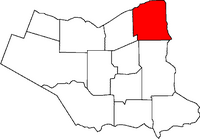St. David's, Ontario
| Niagara-on-the-Lake | |
|---|---|
| Town (lower-tier) | |
| Town of Niagara-on-the-Lake | |
 |
|
| Nickname(s): The Loveliest Town in Canada | |
 Location of Niagara-on-the-Lake in the Niagara Region |
|
| Location in southern Ontario | |
| Coordinates: 43°15′19″N 79°4′18″W / 43.25528°N 79.07167°WCoordinates: 43°15′19″N 79°4′18″W / 43.25528°N 79.07167°W | |
| Country |
|
| Province |
|
| Region | Niagara |
| Settled | 1781 |
| Incorporated | 1792 |
| Government | |
| • Lord Mayor | Patrick Darte |
| • Governing body | Town Council |
| • MP | Rob Nicholson |
| • MPP | Wayne Gates |
| Area | |
| • Land | 132.81 km2 (51.28 sq mi) |
| Elevation | 82.3 m (270.0 ft) |
| Population (2016) | |
| • Total | 17,511 |
| • Density | 131.8/km2 (341/sq mi) |
| Demonym(s) | NOTLer |
| Time zone | Eastern (EST) (UTC-5) |
| • Summer (DST) | Eastern Daylight (EDT) (UTC-4) |
| Postal code | L0S 1J0 |
| Area code(s) | 905/289 |
| Website | www.notl.org |
Niagara-on-the-Lake (2016 population 17,511) is a Canadian town in Southern Ontario where the Niagara River meets Lake Ontario in the Niagara Region of the southern part of the province of Ontario. It is across the Niagara River from Youngstown, New York, US. It is the only town in Canada that has a Lord Mayor.
The settlement, known from about 1781 as Butlersburg, in honour of Colonel John Butler, the commander of Butler's Rangers, was renamed West Niagara to distinguish it from Fort Niagara. It was a British military base and haven for pro-British loyalists fleeing the United States during the volatile aftermath of the American Revolution. Renamed Newark by Lieutenant-Governor John Graves Simcoe in 1792, he made it the first capital of Upper Canada (now the province of Ontario), The first provincial parliament was convened at the Navy Hall on September 17, 1792. Due to Newark's close proximity to the Canada–US border, Simcoe moved the capital in 1797 to York and Newark was renamed 'Niagara' in 1798.
Niagara played a central role in the War of 1812. Niagara was taken in the Battle of Fort George by American forces after a two-day bombardment by cannons from Fort Niagara and the American Fleet, followed by a fierce battle. Later in the war, the town was razed and burnt to the ground by American soldiers as they withdrew to Fort Niagara. Undaunted by this setback, often referred to as the "burning of Newark," the citizens rebuilt the town after the war, with the residential quarter around Queen Street and toward King Street, where the new Court House was rebuilt using material out of range of Fort Niagara's cannons.
...
Wikipedia

